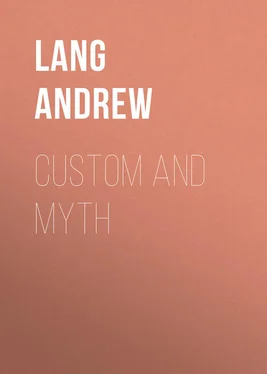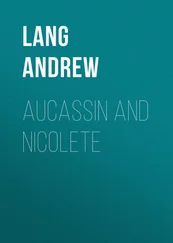Andrew Lang - Custom and Myth
Здесь есть возможность читать онлайн «Andrew Lang - Custom and Myth» — ознакомительный отрывок электронной книги совершенно бесплатно, а после прочтения отрывка купить полную версию. В некоторых случаях можно слушать аудио, скачать через торрент в формате fb2 и присутствует краткое содержание. Жанр: foreign_antique, foreign_prose, на английском языке. Описание произведения, (предисловие) а так же отзывы посетителей доступны на портале библиотеки ЛибКат.
- Название:Custom and Myth
- Автор:
- Жанр:
- Год:неизвестен
- ISBN:нет данных
- Рейтинг книги:3 / 5. Голосов: 1
-
Избранное:Добавить в избранное
- Отзывы:
-
Ваша оценка:
- 60
- 1
- 2
- 3
- 4
- 5
Custom and Myth: краткое содержание, описание и аннотация
Предлагаем к чтению аннотацию, описание, краткое содержание или предисловие (зависит от того, что написал сам автор книги «Custom and Myth»). Если вы не нашли необходимую информацию о книге — напишите в комментариях, мы постараемся отыскать её.
Custom and Myth — читать онлайн ознакомительный отрывок
Ниже представлен текст книги, разбитый по страницам. Система сохранения места последней прочитанной страницы, позволяет с удобством читать онлайн бесплатно книгу «Custom and Myth», без необходимости каждый раз заново искать на чём Вы остановились. Поставьте закладку, и сможете в любой момент перейти на страницу, на которой закончили чтение.
Интервал:
Закладка:
The science of Folklore, if we may call it a science, finds everywhere, close to the surface of civilised life, the remains of ideas as old as the stone elf-shots, older than the celt of bronze. In proverbs and riddles, and nursery tales and superstitions, we detect the relics of a stage of thought, which is dying out in Europe, but which still exists in many parts of the world. Now, just as the flint arrow-heads are scattered everywhere, in all the continents and isles, and everywhere are much alike, and bear no very definite marks of the special influence of race, so it is with the habits and legends investigated by the student of folklore. The stone arrow-head buried in a Scottish cairn is like those which were interred with Algonquin chiefs. The flints found in Egyptian soil, or beside the tumulus on the plain of Marathon, nearly resemble the stones which tip the reed arrow of the modern Samoyed. Perhaps only a skilled experience could discern, in a heap of such arrow-heads, the specimens which are found in America or Africa from those which are unearthed in Europe. Even in the products of more advanced industry, we see early pottery, for example, so closely alike everywhere that, in the British Museum, Mexican vases have, ere now, been mixed up on the same shelf with archaic vessels from Greece. In the same way, if a superstition or a riddle were offered to a student of folklore, he would have much difficulty in guessing its provenance , and naming the race from which it was brought. Suppose you tell a folklorist that, in a certain country, when anyone sneezes, people say ‘Good luck to you,’ the student cannot say à priori what country you refer to, what race you have in your thoughts. It may be Florida, as Florida was when first discovered; it may be Zululand, or West Africa, or ancient Rome, or Homeric Greece, or Palestine. In all these, and many other regions, the sneeze was welcomed as an auspicious omen. The little superstition is as widely distributed as the flint arrow-heads. Just as the object and use of the arrow-heads became intelligible when we found similar weapons in actual use among savages, so the salutation to the sneezer becomes intelligible when we learn that the savage has a good reason for it. He thinks the sneeze expels an evil spirit. Proverbs, again, and riddles are as universally scattered, and the Wolufs puzzle over the same devinettes as the Scotch schoolboy or the Breton peasant. Thus, for instance, the Wolufs of Senegal ask each other, ‘What flies for ever, and rests never?’ – Answer, ‘The Wind.’ ‘Who are the comrades that always fight, and never hurt each other?’ – ‘The Teeth.’ In France, as we read in the ‘Recueil de Calembours,’ the people ask, ‘What runs faster than a horse, crosses water, and is not wet?’ – Answer, ‘The Sun.’ The Samoans put the riddle, ‘A man who stands between two ravenous fishes?’ – Answer, ‘The tongue between the teeth.’ Again, ‘There are twenty brothers, each with a hat on his head?’ – Answer, ‘Fingers and toes, with nails for hats.’ This is like the French ‘ un père a douze fils ?’ – ‘ l’an .’ A comparison of M. Rolland’s ‘Devinettes’ with the Woluf conundrums of Boilat, the Samoan examples in Turner’s’ Samoa,’ and the Scotch enigmas collected by Chambers, will show the identity of peasant and savage humour.
A few examples, less generally known, may be given to prove that the beliefs of folklore are not peculiar to any one race or stock of men. The first case is remarkable: it occurs in Mexico and Ceylon – nor are we aware that it is found elsewhere. In Macmillan’s Magazine 8 8 Nov. 1880.
is published a paper by Mrs. Edwards, called ‘The Mystery of the Pezazi.’ The events described in this narrative occurred on August 28, 1876, in a bungalow some thirty miles from Badiella. The narrator occupied a new house on an estate called Allagalla. Her native servants soon asserted that the place was haunted by a Pezazi. The English visitors saw and heard nothing extraordinary till a certain night: an abridged account of what happened then may be given in the words of Mrs. Edwards: —
Wrapped in dreams, I lay on the night in question tranquilly sleeping, but gradually roused to a perception that discordant sounds disturbed the serenity of my slumber. Loth to stir, I still dozed on, the sounds, however, becoming, as it seemed, more determined to make themselves heard; and I awoke to the consciousness that they proceeded from a belt of adjacent jungle, and resembled the noise that would be produced by some person felling timber.
Shutting my ears to the disturbance, I made no sign, until, with an expression of impatience, E- suddenly started up, when I laid a detaining grasp upon his arm, murmuring that there was no need to think of rising at present – it must be quite early, and the kitchen cooly was doubtless cutting fire-wood in good time. E- responded, in a tone of slight contempt, that no one could be cutting fire-wood at that hour, and the sounds were more suggestive of felling jungle; and he then inquired how long I had been listening to them. Now thoroughly aroused, I replied that I had heard the sounds for some time, at first confusing them with my dreams, but soon sufficiently awakening to the fact that they were no mere phantoms of my imagination, but a reality. During our conversation the noises became more distinct and loud; blow after blow resounded, as of the axe descending upon the tree, followed by the crash of the falling timber. Renewed blows announced the repetition of the operations on another tree, and continued till several were devastated.
It is unnecessary to tell more of the tale. In spite of minute examinations and close search, no solution of the mystery of the noises, on this or any other occasion, was ever found. The natives, of course, attributed the disturbance to the Pezazi , or goblin. No one, perhaps, has asserted that the Aztecs were connected by ties of race with the people of Ceylon. Yet, when the Spaniards conquered Mexico, and when Sahagun (one of the earliest missionaries) collected the legends of the people, he found them, like the Cingalese, strong believers in the mystic tree-felling. We translate Sahagun’s account of the ‘midnight axe’: —
When so any man heareth the sound of strokes in the night, as if one were felling trees, he reckons it an evil boding. And this sound they call youaltepuztli (youalli, night; and tepuztli, copper), which signifies ‘the midnight hatchet.’ This noise cometh about the time of the first sleep, when all men slumber soundly, and the night is still. The sound of strokes smitten was first noted by the temple-servants, called tlamacazque, at the hour when they go in the night to make their offering of reeds or of boughs of pine, for so was their custom, and this penance they did on the neighbouring hills, and that when the night was far spent. Whenever they heard such a sound as one makes when he splits wood with an axe (a noise that may be heard afar off), they drew thence an omen of evil, and were afraid, and said that the sounds were part of the witchery of Tezeatlipoca, that often thus dismayeth men who journey in the night. Now, when tidings of these things came to a certain brave man, one exercised in war, he drew near, being guided by the sound, till he came to the very cause of the hubbub. And when he came upon it, with difficulty he caught it, for the thing was hard to catch: natheless at last he overtook that which ran before him; and behold, it was a man without a heart, and, on either side of the chest, two holes that opened and shut, and so made the noise. Then the man put his hand within the breast of the figure and grasped the breast and shook it hard, demanding some grace or gift.
As a rule, the grace demanded was power to make captives in war. The curious coincidence of the ‘midnight axe,’ occurring in lands so remote as Ceylon and Mexico, and the singular attestation by an English lady of the actual existence of the disturbance, makes this youaltepuztli one of the quaintest things in the province of the folklorist. But, whatever the cause of the noise, or of the beliefs connected with the noise, may be, no one would explain them as the result of community of race between Cingalese and Aztecs. Nor would this explanation be offered to account for the Aztec and English belief that the creaking of furniture is an omen of death in a house. Obviously, these opinions are the expression of a common state of superstitious fancy, not the signs of an original community of origin.
Читать дальшеИнтервал:
Закладка:
Похожие книги на «Custom and Myth»
Представляем Вашему вниманию похожие книги на «Custom and Myth» списком для выбора. Мы отобрали схожую по названию и смыслу литературу в надежде предоставить читателям больше вариантов отыскать новые, интересные, ещё непрочитанные произведения.
Обсуждение, отзывы о книге «Custom and Myth» и просто собственные мнения читателей. Оставьте ваши комментарии, напишите, что Вы думаете о произведении, его смысле или главных героях. Укажите что конкретно понравилось, а что нет, и почему Вы так считаете.












